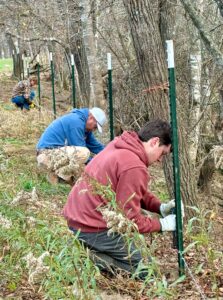Ena Sellers
On Saturday, Nov. 9, a vibrant sense of community filled the corner of Center and East Main streets in downtown Mount Olive as families gathered to celebrate the fourth annual Pickles, Pigs & Swigs festival.
Families were treated to a diverse range of activities at the festival. They enjoyed live music by Zack Lee followed by 42 West Band, savored BBQ sandwiches, sampled craft beer, and indulged in free Mt. Olive Pickles. They also had the chance to meet various area vendors, take pictures with Ollie Q. Cumber, and hop on the Pickle Train for a fun ride. The festival was a perfect blend of new and returning favorites, ensuring there was something for everyone to enjoy.
For more photos follow us on Facebook and view the album here.


KENANSVILLE — Last week, Tracey Simmons-Kornegay, Duplin County Health director, presented the Duplin County Community Health Needs Assessment data findings to the Board of County Commissioners.
According to Kornegay, the population has decreased by about 10% compared to the last census. Currently, 46,923 people live in Duplin County.
“The Hispanic Latino [community] is about twice as much in Duplin County compared to the state,” said Kornegay, emphasizing that 14% of Duplin County residents are foreign-born, 5% higher than the state average. Also, 12.2% of Duplin residents have limited English proficiency, a number that is almost three times higher than the state average.
Kornegay highlighted that 23% of Duplin County residents receive food stamps, 10% more people than the state.
Uninsured youth, who are 18 and younger, account for more than double the state rate. Also, the number of uninsured residents in the 19-34 age group is 12% higher than that of the state.
“In the Social Vulnerability Index (SVI), Duplin County is at .86 and that is out of a 1.0 scale. We are number 15 in the state with sort of the highest number,” said Kornegay.
The SVI is used to identify communities that are especially at risk during public health emergencies due to socioeconomic factors, household composition, minority status, etc.
Kornegay explained that of the ECU Health system, eastern North Carolina region, nine counties out of 15 make up those with the most needs.
The Duplin Coalition for Health has identified access to care, chronic disease prevention, mental health, and substance abuse as the priority focus areas for 2024-2027.

“We will develop our strategic plan for the next three years based on this information and present it to the Board of Health,” explained Kornegay.
According to Kornegay, the top health problems affecting Duplin residents are diabetes, alcohol and drug addiction, obesity, heart disease/ high blood pressure, and mental health.
The health director also noted that there are nine deaths per 1,000 live births in Duplin County.

“That is significant for us as we look at infant health as well as prenatal maternal health,” said Kornegay, explaining that they have recently rolled out a new program called Centering for Pregnancy. With this program, the health department expects better health outcomes as patients will have more time with the provider, and it will also empower moms with patient-centered healthcare.
“Over one-third of Duplin County adults suffer from hypertension, high cholesterol, or diabetes,” said Kornegay, adding that Duplin residents also report a higher average number of days with poor mental health.
To address those needs, the health department partnered with NC STEP and Tarheel Human Services to provide psychotherapy and telepsychiatry services. It has received funding from Trillium to help serve Duplin’s underserved and uninsured population.
Kornegay explained that some of the problems affecting the community’s health are the availability and access to doctors, poverty, and insurance. To alleviate those factors, they partnered with NC Medicis to provide medications at no charge or at a reduced rate for the uninsured and with ECU Health’s pediatrics department and Goshen Medical to provide physicals for children.
“Our plan is to continue to work with everyone to try to offer more affordable care at the health department. We do provide a sliding fee scale for patients if they do bring in their income,” said Kornegay. “Communicable disease, STDs, immunizations, and tuberculosis services are at no charge. And then additionally, there are enhanced services that have been elected to be provided at the health department due to the lack of access that we have in the county.”
Kornegay also highlighted a few health behaviors of concern.
“The state average [of teens giving birth] is 18.2, Duplin County is 37.2. So, that is quite significant for us here in the county,” said Kornegay. “Additionally, we have seen an increase in babies born to mothers with syphilis.”
As of October 2024, there have been 64 incidences of gonorrhea, 242 of chlamydia, 76 of syphilis and 3 of HIV. And five babies were born to moms with syphilis.
Kornegay explained that some of the things the health department is doing as it relates to sexual health are condom distribution, STD screenings, treatments, and oral contraceptives.
Tobacco use is about 5% higher than the state. According to state data, one in eight high school students use a tobacco product. The estimated number of Middle schoolers using tobacco in NC is 18,600, and for high schoolers, it is 57,300, with the number one tobacco product used by youth being e-cigarettes.
“Almost three people in each classroom have access to or use tobacco products. So, if you guys have children, one of three in their class has access to or uses tobacco products,” said Kornegay. Currently, the county is focusing on early intervention and program referrals.
Health factors addressed include broadband access, houses without computers, liquor stores, drinking water safety, housing units in flood hazard areas, housing, homelessness, and transportation for households without motor vehicles.
In terms of food security, Duplin is performing below the state with 13% compared to the state’s 11% food insecurity. Also for child food insecurity at 20% compared to North Carolina at 15%. In 2023, the health department and area partners distributed 1,255 food boxes between March, April, November, and December.
“The health department over the last several years has participated in some community food drives. They started in COVID, and we’ve continued those post-COVID,” said Kornegay, adding that they host one during Easter, Thanksgiving, and Christmas to provide food for the county’s residents. “We have a lot of community partners who come out to this event to try to help serve the residents of the county.”
In other business:
The board approved a public hearing for the Nov. 18 meeting to discuss the proposed 2025 revaluation schedule of property values. A copy of the proposed rates is available for public inspection in the Tax Assessor’s Office at the Hardison Building, 117 Beasley St., Kenansville.
“Our objective is to be fair to all of the citizens of Duplin County and market value is our number one priority. But we can share information on the agriculture community, farmland prices, residential houses, and various neighborhoods in the county,” said Gary Rose, tax administrator, after presenting the board with a schedule of rates used to evaluate and price property in Duplin County. Rose gave an example of a 1,500-square-foot one-story home with a two-car garage and vinyl siding, costing $229,600.
The board approved an expenditure of $4,500 from the opioid fund to create an assessment map as part of an initiative with the Eastern Carolina Council to identify gaps that can be addressed through regional collaboration.
“The analysis will be separated by county, so we’ll know what we look like, as well as aggregated by sub-regions and the full regional area. This process will produce cost savings and benefit estimates for expansion of specific opioid and substance use disorder prevention, treatment, or injury prevention infrastructure, and projections with the expansion of the model,” explained County Manager Bryan Miller, adding that the process will take between nine and 12 months. “Opioid funds are available to cover the cost. And with the approval, will be added to the existing opioid third resolution.”
Miller explained that this would enable them to identify areas where they cannot provide treatment or access to information. He shared as an example that a regional strategy would be effective for establishing a treatment facility, while for educational components, the health department is managing quite well, and a county-focused approach may be sufficient in that aspect.
“If we’re talking about county approaches, then whatever gaps are there, we’re able to fill the gaps. And I think that’s the important part of this. We don’t know where the gaps are until we do an analysis like this,” said Miller. “What this brings to the table is the strategic mindset and the ability of the Recovery Alliance Institute to bring different sectors of the community and the region together to identify where the pitfalls are. The other thing it’s going to do is assess what our needs are going to be three and five years out and see what assets we have in place and see if they’re going to be adequate to cover those needs three and five years out.”
On Nov. 7, Dylan Alexander Jones was sentenced to 12 years, nine months in prison for trafficking counterfeit pills laced with fentanyl following a fatal overdose in Teachey. After his prison time, Jones will be on supervised release for five years. He must complete 50 hours of community service teaching youth about the dangers of fentanyl and the impact of drug abuse.
“The sentencing of Dylan Jones is a pivotal step in our ongoing fight against the devastating impact of drug overdose deaths. We stand firm in our commitment to justice for the victims and their families,” said Duplin County Sheriff Stratton Stokes. “I want to commend our exceptional team for their relentless dedication and professionalism in building this challenging case. Together, we are making strides toward a safer community.”
According to a media release made by Michael F. Easley Jr., U.S. Attorney for the Eastern District, the 24-year-old from Wayne County pled guilty to one count of distribution of fentanyl and one count of possession of a firearm in furtherance of a drug trafficking crime in April. The release indicated that on July 22, 2022, Duplin County Sheriff’s Office deputies responded to a 911 call about an unresponsive male in Teachey who was then confirmed dead by a firefighter on scene. A post-mortem toxicology report indicated fentanyl toxicity as the cause.
Law enforcement analyzed the victim’s cell phone and found he had received pills from an individual using a Snapchat account linked to Jones. GPS data showed they met at a Warsaw rest area shortly before the victim’s death. Additionally, between September and November 2022, law enforcement made three controlled purchases from Jones, all of which contained fentanyl. During the third buy, Jones was arrested while armed with a handgun. A search of his vehicle uncovered a 9mm pistol loaded with 16 rounds, fentanyl, and over $1,600 in cash.
“We are bringing swift justice against anyone trafficking counterfeit pills laced with deadly fentanyl, especially when their poison claims one of our neighbor’s lives,” stated Easley Jr. “North Carolina’s Sheriffs are prioritizing overdose death investigations like never before and have a direct line to my office to prosecute them. Our team has trained law enforcement across the district on building airtight cases to secure firm sentences in federal court. Our Sheriffs are going the distance to get justice for victims and keep North Carolina safe.”
The new 12,363-square-foot facility will house senior and veteran services offices

KENANSVILLE — A dream of a larger senior center has come to fruition for Melisa Brown, Duplin County Senior Services director, with the official opening and ribbon cutting ceremony of the Senior & Veteran Services Center at the Duplin Commons in Kenansville on Nov. 7.
The new 12,363-square-foot facility, now home to the senior services and veterans offices, will enable both departments to provide comprehensive services and foster social connection and community engagement.
The building provides ample and welcoming space for hosting events and facilitates access to resources for more seniors and veterans. It features a state-of-the-art gym, dedicated areas for crafts and classes, a conference room, and indoor and outdoor recreation areas, complete with TVs throughout the facility.

“Here, our seniors will find support to live actively and independently while our veterans will receive the appreciation and assistance that reflects their service to our country,” said County Manager Bryan Miller during the inaugural ceremony, thanking all contributors to the project.
“Your support and commitment ensure this center is not just a building, but a vibrant, caring resource for all of those who walk through the doors,” said Miller. “We are grateful to everyone who contributed to making this vision a reality, and we look forward to all the good this center will bring our community.”
Retired Maj. Harvey Knowles, a World War II veteran, played a rendition of God Bless America with his harmonica, after which County Commissioner Dexter Edwards highlighted the $5 million state grant that helped fund the $6.2 million facility, emphasizing the importance of recognizing veterans.

“For each and every one of you that live here in Duplin County, you look through this facility and just think about what this would cost us from a tax level if we hadn’t had that grant from the state,” Edwards said.
He also spoke about his parents’ volunteer work with Senior Services and showed gratitude for the groundwork laid by seniors.
“They drilled in my heart and in my head that if we didn’t have seniors laying the groundwork for us youngsters, we wouldn’t have anything. So thank you, seniors,” said Edwards.
Brown reflected on the transition from the previous location and expressed her emotions about starting anew.

“Last Friday, we moved the last load from 213 Seminary Street. In the stillness of the moment, I walked around the office, and I remembered the faces of the ones that would not join us today and all the memories over the last 31 years,” said Brown, holding back tears. “Monday morning, we began a new chapter and started creating new, wonderful memories here on 156 Duplin County Street.”
Retired U.S. Army veteran Monte E. Thorne spoke about the duty to take care of veterans when they return home and expressed his optimism that with the new facility, Duplin County is now equipped to fulfill that duty.
“The veterans and families who will come here will often be concerned and sometimes may even be a little nervous. Sometimes they will come here on one of the most stressful days of their lives. Sometimes even unknowingly, in the last days of their lives. In other words, they will come here in the moments when they need the services the most. And when they do, we need to serve them just as well as they have served our country. Hopefully, this center will help us do just that,” said Thorne.

“Thank you for your courage, your passion, and your willingness to be moved by selfless service. Let us all remember that freedom is not free. But because of our veterans and our current men and women who are serving, we can proudly say, veterans, that our bill has been paid in full. To all who have worn the uniform and served our great nation, I salute you. Your courage, sacrifices, and unwavering dedication to duty has kept us safe and protected our most cherished freedoms. So on behalf of a grateful nation, thank you. We honor you today and every day.”
The ceremony concluded with a ribbon cutting followed by a tour of the new facility.
For more photos follow us on Facebook and view the album here.
The mountains continue to call to a group of River Landing and Wallace residents, who have made numerous trips to western North Carolina in the weeks since Tropical Storm Helene devastated the region. Emily Ludlum, Melissa Stevens, Jennifer Johnson and their families and neighbors have been collecting donations and supplies since the storm hit on Sept. 30.
Most recently, the group traveled to the small town of Minneapolis to deliver Thanksgiving meals and to help one family farm repair more than four miles of fencing.
“This is the worst area I’ve seen so far,” Ludlum told Duplin Journal. “It is a pretty low-income area, so people didn’t have much to start with, and the storm has just devastated the people there.”
One such family devastated by the storm is that of Rachel and Brandon Townsend, who happen to be third-generation cattle farmers.
“In talking to Rachel, their biggest need was fencing,” Ludlum said. “She specifically said they needed barbed wire and T-posts.”
Ludlum committed to help the Townsends’ farm by providing the wire and T-posts, but unfortunately, what was needed came to a cost of $13,000. “We couldn’t do that, so we committed to buying 500 T-posts and that was a little more manageable,” Ludlum said. “We put a group together and worked the weekend to help repair what fencing we could.”
That involved cutting down and chopping up trees along the way amidst some of the worst damage the team has seen so far.
“The pastures they have are now covered with river rock and mud,” Ludlum explained. “It’s just changed the landscape. One pasture now has a 10-foot-deep pond that’s about 50 feet wide. And then, the trees are hardwoods so they’re difficult to cut down and move.”
The Townsends gained back one field from the work the group was able to do over the weekend. They also helped the family purchase hay to feed the cows. “Because the pasture is covered with river rock and mud, the cows can’t eat,” Ludlum said, “so they’re having to feed them hay earlier than they normally would.”
And speaking of food, delivering Thanksgiving meals was the other portion of this past weekend’s trip.
“Our hometown church, Wallace Presbyterian, graced us with a large amount of money to do with what we needed,” Ludlum said. “I know when our houses flooded [in Hurricane Florence in 2018], it was right at the holidays. So we wanted to help a few families be able to have a Thanksgiving meal this year.”
Ludlum said the Wallace Piggly Wiggly worked to get everything ordered, including 55 turkeys, casseroles, desserts and fixings.
“We delivered door-to-door,” she said. “The people gave us so much love and appreciation. Any little bit you offer, they are so grateful.”
Minneapolis is full of houses that have been moved off their foundations and even split in two from mudslides. “We couldn’t get there on our first trip because it is so remote and it was so heavily damaged,” Ludlum said. “I know I probably say this every time, but this one was a hard one.”
Next up for the group — setting up a toy shop in Black Mountain and Swannanoa. Ludlum said they’re working with social workers at three schools in that area to identify the children who are most in need of a happy Christmas.
They are currently accepting donations of toys, wrapping paper, bows and tape, at the Wallace Fire Department or Duplin Journal office.
“We are really trying to ensure a Christmas for these kids,” Ludlum said.
Though the need is still great in western NC, Ludlum said the areas she and her team have served are all well-stocked on supplies.
“What they need is muscle, tradesmen, people to cook hot meals, people to work in the distribution centers, and they need money,” she said.
 Twitter
Twitter Facebook
Facebook Instagram
Instagram





